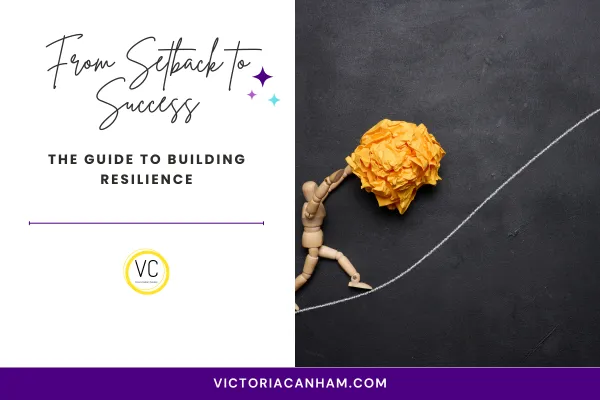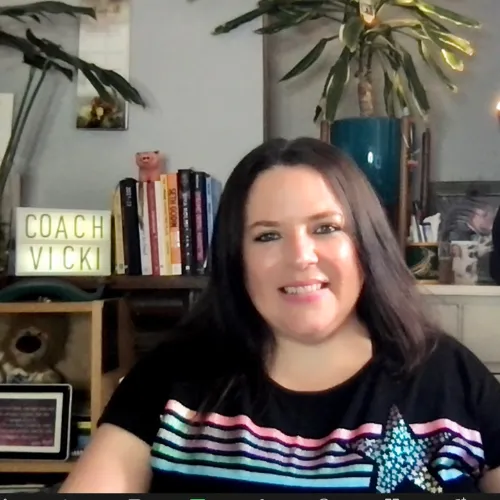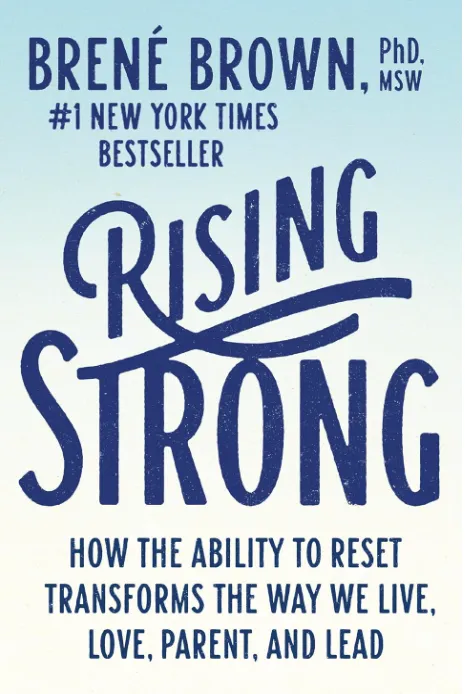From Setback to Success: The Guide to Building Resilience
Victoria Canham • 10 July 2024 • 6 min read

"When we are no longer able to change a situation - we are challenged to change ourselves." ~ Viktor Frankl
You've climbed the career ladder steadily, but lately, it feels like you've hit a dead end. The projects you once found exciting now feel routine. Or perhaps, your business has taken a financial knock, leaving you wondering how to pick yourself (and your company) up again. These are common challenges faced by many professionals and business owners. But the good news is, you can develop the psychological resilience to overcome them and emerge stronger.
What is psychological resilience?
The psychology of resilience is a field of study that explores why some individuals are able to bounce back and thrive in the face of adversity, while others struggle to cope and may experience long-lasting negative effects.
Resilience is not just about enduring difficult circumstances; it's about adapting, growing, and even flourishing in the face of challenges.
Resilience is often defined as the ability to withstand, adapt to, and recover from adversity or stress. It involves harnessing inner strengths and external resources to navigate challenges and emerge stronger.
Resilience is not a fixed trait; rather, it's a dynamic process that can be developed and cultivated over time. It involves various factors, including individual traits, social support, coping strategies, and environmental influences.
Resilience-Building Strategies
There are various strategies and interventions that can help foster resilience and enhance coping skills. These may include:
Cognitive-behavioural techniques, such as reframing negative thoughts and beliefs.
Optimism, hope, and a sense of purpose.
Mindfulness and relaxation practices to reduce stress and promote emotional well-being.
Social support networks and community resources for encouragement and assistance.
Self-care practices that prioritise physical, emotional, mental well-being, and stress relief.
Seeking professional help, such as Coaching or therapy to process trauma and develop coping strategies.
Exercises and Routines for Building Resilience:
1. Gratitude Journaling:
Routine: Dedicate 5-10 minutes each morning or evening to write down 3 things you're grateful for, big or small.
Benefits: Gratitude journaling fosters a positive outlook and helps reframe challenges by focusing on the good things in life.
2. Challenge Reframing Exercise:
Exercise: When faced with a setback, write down the situation. Then, reframe it from a negative perspective to a more positive or neutral one. For example, "I lost this client" becomes "This frees up time to pursue other clients who are a better fit for my business.
Benefits: Challenge reframing helps you view setbacks as opportunities for growth and reduces stress associated with negative self-talk.
3. Strength Identification Exercise:
Exercise: Think about past accomplishments or positive feedback received, and list 5 personal strengths you possess.
Benefits: Identifying strengths boosts self-confidence and helps you leverage them when facing difficulties.
4. Relaxation Techniques:
Routine: Integrate short relaxation techniques like deep breathing exercises or progressive muscle relaxation into your daily routine. There are many free guided meditations available online or through apps.
Exercise: Find a quiet space, sit comfortably, and close your eyes. Focus on your breath, feeling your chest and abdomen rise and fall with each inhale and exhale. If your mind wanders, gently guide your attention back to your breath. Start with 5 minutes and gradually increase as you become comfortable.
Benefits: Relaxation techniques help manage stress, improve focus, and promote emotional well-being, all of which contribute to resilience.
5. Positive Visualisation:
Exercise: Take 5-10 minutes to visualise yourself successfully navigating a challenging situation. Focus on the details of your actions and feelings of calmness and competence.
Benefits: Positive visualisation helps build confidence and mental preparedness for challenging situations.
5. Social Support Check-In:
Routine: Schedule regular calls, texts, or meetings with friends, family, or colleagues who provide you with encouragement and support.
Benefits: Strengthens social connections and fosters a sense of belonging, crucial for resilience.
6. Develop Healthy Coping Mechanisms:
Identify healthy coping mechanisms that work for you during stressful times. This might include exercise, spending time in nature, connecting with loved ones, engaging in hobbies, or listening to calming music.
7. Develop a Growth Mindset:
Challenge negative self-talk and adopt a growth mindset. Instead of viewing setbacks as failures, see them as opportunities to learn and improve.
Quick Wins
Think of resilience as your business's disaster recovery plan. It's about having the tools and mindset to adapt to challenges and bounce back stronger. Here are three practical strategies you can implement today:
Develop a growth mindset: Focus on learning from setbacks and view challenges as opportunities.
Build strong support networks: Surround yourself with positive and encouraging colleagues, mentors, or even a business support group.
Practice self-care: Prioritise sleep, healthy eating, and activities that manage stress.
Of course, not all individuals who experience adverse conditions develop poor future outcomes, some in fact experience post-traumatic growth—a positive psychological change that occurs as a result of facing and overcoming adversity. This may involve increased personal strength, greater appreciation of life, deeper relationships, and a heightened sense of meaning or purpose.
Overall, understanding the psychology of resilience can provide valuable insights into how individuals can cultivate inner strength, adaptability, and resourcefulness to navigate life's challenges and thrive in the face of adversity.
Ready to unlock your full potential and bounce back from challenges stronger than ever?
This blog post is just the beginning. I offer personalised coaching programs specifically designed to help mid-career professionals and business owners like you build resilience, navigate challenges, and emerge stronger.
Schedule a free Peak Performance Discovery Call today!
During this 30-minute call, we'll discuss your unique situation and explore how my coaching program can help you:
Develop a growth mindset to see challenges as opportunities.
Build strong support networks for encouragement and guidance.
Implement effective self-care practices to manage stress and boost well-being.
Discover and leverage your inner strengths to overcome obstacles.
Create a personalised action plan for building lasting resilience.
Don't wait – take the first step towards a more resilient and successful you!
Click here to schedule your free Peak Performance Discovery Call today!
P.S. This call is completely free, with no obligation to enrol in any program. It's simply a chance to explore how coaching can help you achieve your goals.
Recommended Reading
Brené Brown is a researcher and professor who has studied vulnerability and courage for over two decades. In Rising Strong, she delves into the concept of resilience, showing how we can use our experiences of failure and hardship to rise stronger. The book is full of practical advice and exercises that can help you develop your own resilience.
We’re not just about overcoming obstacles, we’re about transforming lives.

Victoria Canham - Mental Performance Coach
Victoria is an ICF-accredited certified professional coach, who offers bespoke performance coach. With a background in change management and countless hours of professional coaching training and experience, I made the big switch to full-time coaching in 2020. I know what it is like to suddenly have the rug pulled out from under you while you're busy making other plans, as a result, I now help people like you to bounce back from adversity and major setbacks to emerge stronger and better than ever before. Our clients have transformed from feeling overwhelmed by life's challenges to confident, goal-driven individuals who navigate life's obstacles with ease. They've achieved their personal and professional objectives and embodied peak performance in all aspects of life. You too can experience this transformation. This is your moment. Your chance to take control, to choose growth over stagnation, achievement over inaction. This is your opportunity to prove to yourself that you're not defined by your challenges—you're defined by how you rise above them. Are you ready to transform your life and achieve peak performance?
FREE RESOURCES
Webcopy and logo used by permission. No reproduction or retransmission is permitted without expressed written consent from iPEC.
Sign Up for My Weekly High Performance Newsletter
© Copyright 2026 Victoria Canham Coaching | Website built by Me on FEA Create (aff.)
Performance Coaching Reading, London, Berkshire, Oxford | St George's Road, Reading, Berkshire, United Kingdom, RG30 2RL | +44 7377 527 529 | [email protected] Open Monday to Friday 9 am until 5 pm



Facebook
Instagram
LinkedIn
Youtube
TikTok